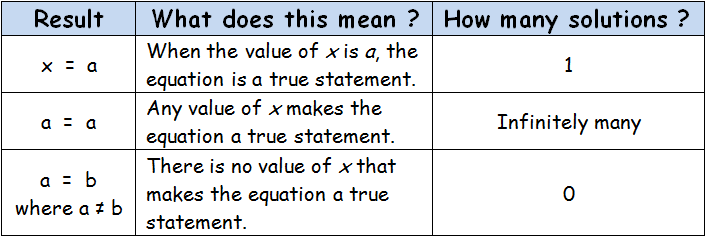EQUATIONS WITH MANY SOLUTIONS OR NO SOLUTION
Subscribe to our ▶️ YouTube channel 🔴 for the latest videos, updates, and tips.
When we solve a linear equation in one variable, we may find exactly one value of x that will make the equation a true statement. But, when we simplify some equations, we may find that they have more than one solution or they do not have solution.
The table given below will help us to find the number of solutions to a linear equation in one variable.

Example 1-5 : In each of the linear equation, say whether the equation has infinitely many solutions or no solution.
Example 1 :
4x - 3 = 2x + 13
Solution :
4x - 3 = 2x + 13
Add 3 to both sides.
4x = 2x + 16
Subtract 2x from each side.
2x = 16
Divide each side by 2.
x = 8
Justify and Evaluate :
Substitute x = 8 in the given equation.
4(8) - 3 = 2(8) + 13 ?
32 - 3 = 16 + 13 ?
29 = 29 ----> True
Substitute some other value for x, say x = 10.
4(10) - 3 = 2(10) + 13 ?
40 - 3 = 20 + 13 ?
37 = 23 False
Only x = 8 makes the equation a true statement and not any other value.
So, the given equation has only one solution, that is
x = 8
Example 2 :
4x - 5 = 2(2x - 1) - 3
Solution :
4x - 5 = 2(2x - 1) - 3
Use distributive property.
4x - 5 = 2(2x) - 2(1) - 3
Simplify
4x - 5 = 4x - 2 - 3
4x - 5 = 4x - 5
We find the same coefficient for x on both sides.
So, subtract 4x on both sides to get rid of x-terms.
-5 = -5
When we solve the given equation, we don't find 'x' in the result.
But the statement (-5 = -5) we get at last is true.
So, the given equation equation has infinitely many solutions.
Example 3 :
4x + 2 = 4x - 5
Solution :
Solve the given equation.
We find the same coefficient for x on both sides.
So, subtract 4x on both sides to get rid of x-terms.
4x + 2 = 4x - 5
2 = -5
When we solve the given equation, we don't find "x" in the result.
But the statement (2 = -5) we get at last is false.
So, the given equation has no solution.
Example 4 :
5(x - 2) - 3x = 2(x - 5)
Solution :
5(x - 2) - 3x = 2(x - 5)
Use distributive property.
5x - 10 - 3x = 2x - 10
Simplify
5x - 10 - 3x = 2x - 10
2x - 10 = 2x - 10
We find the same coefficient for x on both sides.
So, add 2x to both sides to get rid of x-terms.
-10 = -10
When we solve the given equation, we don't find 'x' in the result.
But the statement (-10 = -10) we get at last is true.
So, the given equation has infinitely many solutions.
Example 5 :
(1/2)(6 - 4x) = 5 - 2x
Solution :
(1/2)(6 - 4x) = 5 - 2x
Use distributive property.
(1/2)(6) - (1/2)(4x) = 5 - 2x
Simplify
3 - 2x = 5 - 2x
We find the same coefficient for x on both sides.
So, add 2x to both sides to get rid of x-terms.
3 = 5
When we solve the given equation, we don't find 'x' in the result.
But the statement (3 = 5) we get at last is false.
So, the given equation has no solution.
Example 6 :
(1/3)(15 - 6x) = 5 - ax
If the linear equation above has infinitely many solutions, what is the value of a?
Solution :
(1/3)(15 - 6x) = 5 - ax
Use Distributive Property.
(1/3)(15) - (1/3)(6x) = 5 - ax
5 - 2x = 5 - ax
Subtract 5 from both sides.
-2x = -ax
Multiply both sides by -1.
2x = ax
In the equation above, if a = 2,
2x = 2x
The above equation is true for all real values of x. That is, the above equation has infinitely many solutions.
Therefore, the given equation has infinitely many solutions when a = 2.
Example 7 :
4x + 13 = 7(x - 2) + bx
If the linear equation above has no solution, which of the following could be the value of b?
Solution :
4x + 13 = 7(x - 2) + bx
Use Distributive Property.
4x + 13 = 7x - 14 + bx
4x + 13 = bx + 7x - 14
4x + 13 = (b + 7)x - 14
In the equation above, if b + 7 = 4,
4x + 13 = 4x - 14
13 = - 14
(false statement)
So, the given equation has no solution when b + 7 = 4.
b + 7 = 4
Subtract 7 from both sides.
b = -3
Therefore, the given equation has no solution when b = -3.
Subscribe to our ▶️ YouTube channel 🔴 for the latest videos, updates, and tips.
Kindly mail your feedback to v4formath@gmail.com
We always appreciate your feedback.
About Us | Contact Us | Privacy Policy
©All rights reserved. onlinemath4all.com

Recent Articles
-
Times Table Shortcuts
Dec 30, 25 07:14 PM
Times Table Shortcuts - Concept - Examples -
10 Hard SAT Math Questions (Part - 42)
Dec 30, 25 05:52 AM
10 Hard SAT Math Questions (Part - 42) -
10 Hard SAT Math Questions (Part - 38)
Dec 29, 25 04:21 AM
10 Hard SAT Math Questions (Part - 38)

